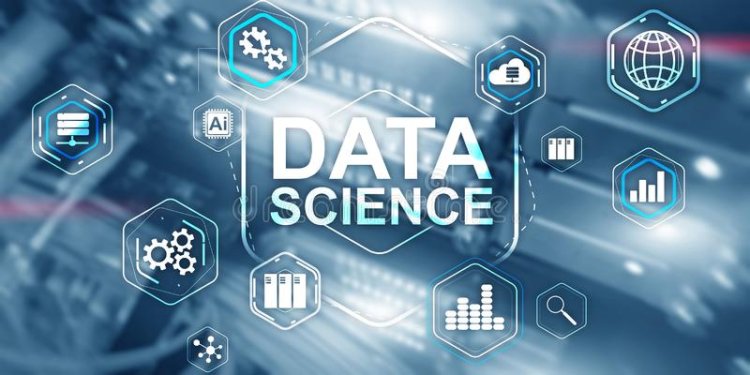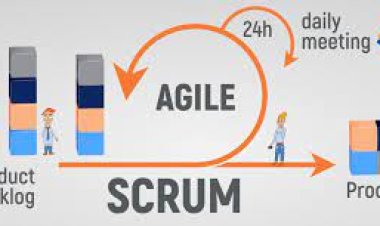Data Science
The fields of mathematics, statistics, computer science, and machine learning are all brought together in the field of data science.

Data Science
What is Data Science? : Beginner’s Guide
The discipline of data science is one that is just beginning to emerge, but it is already becoming increasingly important. It is the newest buzzword in the field of information technology, and the demand for it in the market has been continuously expanding. Because businesses increasingly require help turning raw data into actionable insights, there has been an explosion in the demand for data scientists. The likes of Google, Amazon, Microsoft, and Apple have been some of the most active recruiters of data scientists in recent years. Data Science is another area that is becoming increasingly desirable for IT people to work in.
The demand for data science is expected to rise at a compound annual growth rate (CAGR) of 16.43% and attain the market size of a whopping 378.7 Billion over the projection period of 2022 to 2030, according to a recent analysis published by Precedence Research.
In that case, what precisely is Data Science, and why is it so popular in the modern world?
Continue reading if you want to learn more about Data Science, all right?
What is Data Science?
The fields of mathematics, statistics, computer science, and machine learning are all brought together in the field of data science. The process of gathering, analysing, and interpreting data in order to get insights into the data that can assist decision-makers in making more informed judgements is referred to as "data science."
Data science is employed in nearly every industry in the world today because of its ability to forecast customer behaviour and trends as well as locate new business prospects. It provides companies with the information they need to make educated decisions about the marketing and development of their products. It serves as a tool for identifying fraudulent activity and improving the efficiency of processes. Data science is also utilised by governments in an effort to improve the effectiveness of the delivery of public services.
In layman's words, data science is the process of helping to analyse data and derive useful insights from it by combining abilities in mathematics and statistics, the ability to programme, and domain-specific knowledge.
Importance of Data Science
These days, businesses are inundated with an excessive amount of data. Data science will assist in the process of gleaning valuable insights from such information by combining a wide variety of methodologies, technological tools, and other resources. Numerous industries, like e-commerce, banking, medical, and human resources, amongst others, present companies with massive amounts of data. They are able to process all of them with the assistance of Data Science techniques and technology.
History of Data Science
The phrase "Data Science" was coined in the beginning of the 1960s to assist with the comprehension and analysis of the large volumes of data that were being acquired at the time. Data science is a field that is continuously undergoing expansion. It is comprised of the application of computer science and statistical methodologies in order to gain insights and produce meaningful forecasts in a wide range of sectors.
Data Science – Prerequisites
- Statistics
The field of data science draws heavily from statistics in order to identify and convert patterns within data sets into evidence that can be utilised. This is accomplished through the application of complicated machine-learning procedures.
Learn the fundamental ideas of statistics that are used in data science, machine learning, and business intelligence by consulting the statistics for data science resource.
- Programming
Python, R, and SQL are the three programming languages that are used the most frequently. It is essential to acquire at least some level of programming skills in order to carry out a data science project in an effective manner.
Check out the free R Studio Tutorial course to learn how to analyse raw data and generate useful insights. The course will teach you how to use a variety of approaches and tools.
- Machine Learning
Machine learning, an essential part of data science, makes it feasible to generate reliable forecasts and estimates. This is one of the many applications of machine learning. If you want to be successful in the field of data science, you absolutely need to have a solid understanding of machine learning.
- Databases
In this field, you really need to have a solid comprehension of how databases work, as well as the abilities to manage and extract data from them.
- Modeling
You are able to quickly calculate and make predictions by utilising mathematical models based on the facts you already possess. Modelling aids in choosing which algorithm is most suited to solve a certain issue as well as how to train these models to do their tasks more effectively.
What is Data Science used for?
- Descriptive Analysis
It assists in showing data points accurately for patterns that may arise that satisfy all of the restrictions that are imposed by the data. In other words, it entails organising, sorting, and altering data in order to produce information that provides information that is insightful about the data that is presented. In addition to this, it requires transforming the raw data into a format that can be easily comprehended and interpreted by the user.
- Predictive Analysis
It is the process of using historical data along with various techniques like data mining, statistical modeling, and machine learning to forecast future results. Utilizing trends in this data, businesses use predictive analytics to spot dangers and opportunities.
- Diagnostic Analysis
It is an in-depth examination to understand why something happened. Techniques like drill-down, data discovery, data mining, and correlations are used to describe it. Multiple data operations and transformations may be performed on a given data set to discover unique patterns in each of these techniques.
- Prescriptive Analysis
Prescriptive analysis advances the use of predictive data. It foresees what is most likely to occur and offers the best course of action for dealing with that result. It can assess the probable effects of various decisions and suggest the optimal course of action. It makes use of machine learning recommendation engines, complicated event processing, neural networks, simulation, graph analysis, and simulation
What is the Data Science process?
- Obtaining the data
The first thing that has to be done is to figure out what kind of data needs to be analysed, and then you need to export that data into either an Excel file or a CSV file.
- Scrubbing the data
It is necessary because before you can read the data, you need to make sure that it is in a state that is completely legible, without any errors, and without any missing or incorrect information.
- Exploratory Analysis
Visualising the data in a variety of different ways and recognising trends in order to search for anything that is not typical are both necessary steps in the analysis process. In order to analyse the data, you need to have a very good attention to detail so that you can see anything that is incorrect or missing.
- Modeling or Machine Learning
Based on the data that has to be analysed, a data engineer or scientist will set down instructions for the Machine Learning algorithm to follow in order to complete its task. The algorithm makes use of these instructions in an iterative manner in order to produce the desired output.
- Interpreting the data
At this point, you will reveal your findings to the organisation and give a presentation on them. Your ability to communicate your results is going to be the single most important talent you possess in this situation.
What are different Data Science tools?
The following are some examples of technologies that will assist data scientists in making their jobs easier, and we hope you find them useful.
Analysis of Data Using Informatica Excel, RapidMiner, PowerCenter, and SAS are among examples.
Tableau, Qlikview, RAW, and Jupyter are examples of data visualisation software.
Data Warehousing: Informatica/Talend, Apache Hadoop, and Microsoft HD Insights
H2O.ai, Datarobot, Azure ML Studio, and Mahout are some examples of data modelling tools.
Benefits of Data Science in Business
- Enhances the ability to predict business outcomes
- Better decision making through the interpretation of complicated data
- Development of new products
- Enhances the safety of the data.
- Product development with the end user in mind.
Applications of Data Science
- Product Recommendation
Customers might be influenced to purchase similar products through the use of the product recommendation strategy. For instance, a salesman at Big Bazaar is attempting to boost the store's revenue by offering discounts and combining things together in an effort to sell more of each item. As a result, he discounted the price of the shampoo and conditioner sets by bundling them together. In addition, clients will purchase both of them together at a price that is lowered.
- Future Forecasting
It is one of the methods that is utilised frequently in the field of Data Science. The forecasting of both the weather and the future is carried out on the basis of a wide variety of data types that have been gathered from a wide variety of sources.
- Fraud and Risk Detection
This is one of the uses of data science that makes the most sense. Due to the proliferation of online transactions, it is possible for you to lose your data. For instance, the identification of fraudulent activity on credit cards is dependent on the amount, merchant, location, and time of the transaction, among other factors. In the event that any of them appears to be abnormal, the transaction will be automatically cancelled, and your card will be blocked for a period of at least 24 hours.
- Self-Driving Car
One of the most influential and influential inventions in the modern world is the self-driving car. We are teaching our automobile to reason and decide on its own based on the information it has accumulated. During this phase of the process, we have the ability to punish our model if it does not perform enough. When it begins gaining knowledge from all of its experiences in real time, the automobile gradually develops a higher level of intelligence over time.
- Image Recognition
Data science can detect the object in an image and then categorise it for you when you want to recognise some photographs. Face recognition is perhaps the most well-known application of image recognition technology. If you instruct your smartphone to unblock face recognition, it will scan your face. Therefore, the system will initially identify the face, after which it will determine whether or not yours is a human face, and last, it will determine whether or not the phone actually belongs to its rightful owner.
- Speech to text Convert
Speech recognition refers to the process of teaching a computer to comprehend human language naturally. Virtual assistants such as Alexa, Siri, and Google Assistant are already extremely commonplace in today's society.
- Healthcare
The field of healthcare data science provides aid to a variety of subfields within the healthcare industry, including Medical Image Analysis, the Development of New Drugs, Genetics and Genomics, and the Provision of Virtual Patient aid.
- Search Engines
Search engines such as Google, Yahoo, Bing, and Ask, amongst others, offer us with a large number of results in a very short amount of time. Several different data science algorithms are responsible for making this a reality.
How to become Data Scientist?
Role of a Data Scientist
It is becoming increasingly obvious that data is a valuable asset as firms generate more data than they ever have before. On the other hand, in order to derive useful insights from data, the data itself needs to be analysed, and this is where data scientists come in. A person who specialises in the process of gathering, organising, analysing, and interpreting data in order to identify patterns, trends, and correlations is known as a Data Scientist.
Data scientists play an important part in ensuring that businesses and other organisations make well-informed decisions. They collaborate closely with the executives of the company to establish particular goals, such as classifying customers according to their preferences and pushing for advancements in the quality of products and services. Data scientists are able to study enormous datasets in order to find patterns and insights that assist organisations in making informed decisions by employing sophisticated machine learning algorithms and statistical models.
Data scientists typically possess a diverse set of abilities, including technical know-how as well as expertise in analysing and visualising data. They are required to have knowledge of statistical analysis, programming languages, algorithmic approaches to machine learning, and database management systems.
Let's have a look at a general overview of the obligations that a professional Data Scientist is responsible for.
- Data collection, cleaning, and organisation in preparation for use in predictive and prescriptive modelling
- The process of examining enormous amounts of data in order to identify tendencies and patterns
- Employing computer languages to organise the data and transform it into information that can be used; working with stakeholders to comprehend operational challenges and devise data-driven responses.
- constructing predictive models through making use of statistical models in order to anticipate future developments
- Developing, keeping up with, and keeping an eye on machine learning models
- Creating data-driven solutions through the development and application of sophisticated machine learning algorithms and other analytic approaches
- Providing stakeholders with information about solutions that are based on data.
- Using a number of different data mining technologies, uncover previously unknown patterns and trends inside enormous databases.
- Using data visualisations, reports, dashboards, and presentations to develop and validate data-driven solutions.
In conclusion, the position of Data Scientist is an extremely important one for companies who want to base their decisions on data. Data Scientists are tasked with the responsibility of gathering, organising, analysing, and interpreting data in order to discover patterns and correlations. In addition to this, they create pipelines for the processing of data, designs for reporting and dashboards, and models for predicting future trends. They need to have an understanding of the business context as well as the requirements of the customers in order to be successful in the area.
Steps to Become a Data Scientist
The subject of data science is one of the areas in the technology business that is expanding at one of the highest rates, and there is a significant need for qualified experts in this area. If you are considering pursuing a career in this industry, you might be interested in learning more about the steps involved in becoming a Data Scientist. In the following, we will give an outline of the requirements needed to get started in this sector and become successful in it.
- Learn the Basics:If you want to become a data scientist, the first thing you need to do is familiarise yourself with the principles of data science and analytics. It is necessary for you to have knowledge of data management, statistics, mathematics, and programming disciplines. You may find a wealth of resources and courses on the internet that teach you about these subjects.
- Develop Practical Skills: Once you have a solid fundamental grasp of data science, the next step is to work on developing your practical abilities so that you can use them effectively in your professional life. For example, you should become familiar with programming languages such as R and Python, as well as coding and database management systems. In addition to this, you should consider honing your skills in machine learning and data analysis.
- Earn a Post Graduate Certificate or a Degree: The majority of employers prefer to hire data scientists who have earned a postgraduate or master's degree in an area that is related to their work, such as computer science or applied mathematics. If you want to become a successful data scientist, getting a degree in data science or analytics will help you obtain the knowledge, expertise, and skills that are necessary for the job.
- Work on Projects: One of the finest methods to grow Your Data Science abilities Working on projects is one of the finest methods to grow your abilities in Data Science. You can search for projects online, or you can get in touch with businesses that are looking for data scientists. Gaining experience in data analysis, machine learning, and the various tasks that fall under the umbrella of data science is something that may be accomplished by working on projects.
- Stay Up-to-Date: If you want to keep one step ahead of the competition, you'll need to maintain a current knowledge base in Data Science. Maintain a watchful eye on recent developments in the sector and sign up for notable Data Science journals.
It is possible to become a Data Scientist if one is willing to put in the necessary amount of effort and attention. If you put the advice from up above into practise, you'll be well on your way to a successful career in the field of data science.
At this point, the question that needs to be asked is, "Is there a one-stop solution that covers all of the necessary steps to become a professional Data Scientist?"
Absolutely!
Great Learning’s Data Science Courses
Courses in this cutting-edge sector can be found on the industry-leading ed-tech platform Great Learning, which is part of the BYJU group. These courses are both comprehensive and current. The Data Science courses offered by Great Learning are meant to be comprehensive and engaging. This provides students with the opportunity to build all of the critical skill sets that are required of Data Scientists. Great Learning has formed partnerships with some of the most famous colleges in the world in order to provide these online classes. Some of these universities include the Massachusetts Institute of Technology (MIT), the University of Texas at Austin (UT Austin), Northwestern University, and the National University of Singapore (NUS), amongst others.
The course material includes a wide range of topics, beginning with the principles of statistics and mathematics and progressing to more complex subjects such as database management systems, machine learning, deep learning, natural language processing (NLP), data visualisation, and many more. The professors, who are experienced practitioners and professional Data Scientists, also provide practical instruction on applying the appropriate tools and approaches to tackle real-world challenges that are encountered in the field of Data Science.
In addition, students have access to a wealth of tools that support their individual learning experiences. Some examples of these resources include video lectures, hands-on lab sessions, courseware, capstone projects, and a discussion forum. The courses also include industry-specific examples to help students better grasp how Data Science may be applied to a variety of different fields, including but not limited to healthcare, banking, e-commerce, and others.
In addition to the extensive curriculum, the courses also provide a variety of certificates to confirm the students' newly gained knowledge and skills. Additionally, Great Learning collaborates with leading institutions to offer students the chance to participate in internships and secure full-time employment.
The Data Science courses offered by Great Learning are accessible to a wide variety of students, ranging from novices to seasoned professionals in need of a refresher. These courses may help students become qualified Data Scientists with an active certification in a relatively short amount of time.
Learn more about the top nine job roles in the field of data science for 2023 by reading more here.
FAQs
- What is data science in simple terms?
A branch of study known as data science is one that makes use of data for a variety of research and reporting objectives, with the end goal of gleaning insights and meaning from that data.
- What does a data scientist do?
Data scientists are responsible for the creation of algorithms as well as their use. This method typically entails utilising and constructing machine learning tools in addition to personalised data products in order to assist organisations and clients in interpreting data in a manner that is beneficial.
- What is a data science example?
The use of data science in the research of the COVID-19 virus and the development of a vaccine or cure for it is now one of the most significant applications of data science. Fraud detection, automated customer service, suggestions for healthcare, identification of fake news, recommendation systems for online shopping and entertainment, and many other applications are also included in data science.
- What is Data Science course eligibility?
There may be variations in the prerequisites required to enrol in a Data Science class based on the educational establishment that is providing the programme. Candidates should have a minimum educational qualification of a bachelor's degree in a relevant discipline such as computer science, mathematics, statistics, or engineering, but there are exceptions to this rule. In general, candidates should have this level of education. A prior understanding of programming languages such as Python or R may also be required of candidates for admission at some educational institutions. More information regarding the prerequisites for taking the data science courses.
- Can I learn Data Science on my own?
Yes, but in order to become an expert, you will need to register in a programme that will provide you with the appropriate training, direction, and supervision.
Conclusion
Tools and methods from the field of data science provide a significant contribution to the expansion of a company. Every industry is undergoing a digital revolution, and as a result, there is a growing demand for people who possess relevant skills and knowledge. In order to attract and retain the best talent, organisations are offering competitive compensation. If you are considering a career in data science or transferring your current profession to roles such as business analysts, data analysts, data engineers, analytics engineers, etc., then the following information is for you. Check out the postgraduate programme in Data Science and Engineering that Great Learning has to offer. This programme will assist you in acquiring important data science tools, techniques, and hands-on applications by having you work through industry case studies.













